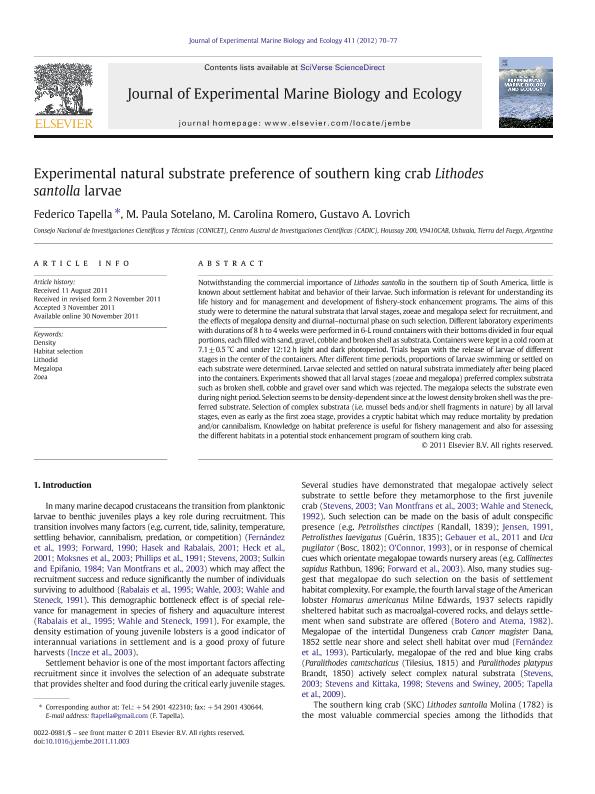Mostrar el registro sencillo del ítem
dc.contributor.author
Tapella, Federico

dc.contributor.author
Sotelano, María Paula

dc.contributor.author
Romero, Maria Carolina

dc.contributor.author
Lovrich, Gustavo Alejandro

dc.date.available
2021-11-30T10:34:54Z
dc.date.issued
2012-01
dc.identifier.citation
Tapella, Federico; Sotelano, María Paula; Romero, Maria Carolina; Lovrich, Gustavo Alejandro; Experimental natural substrate preference of southern king crab Lithodes santolla larvae; Elsevier Science; Journal of Experimental Marine Biology and Ecology; 411; 1-2012; 70-77
dc.identifier.issn
0022-0981
dc.identifier.uri
http://hdl.handle.net/11336/147677
dc.description.abstract
Notwithstanding the commercial importance of Lithodes santolla in the southern tip of South America, little is known about settlement habitat and behavior of their larvae. Such information is relevant for understanding its life history and for management and development of fishery-stock enhancement programs. The aims of this study were to determine the natural substrata that larval stages, zoeae and megalopa select for recruitment, and the effects of megalopa density and diurnal-nocturnal phase on such selection. Different laboratory experiments with durations of 8 hours to 4 weeks were performed in 6-L round containers with their bottoms divided in four equal portions, each filled with sand, gravel, cobble and broken shell as substrata. Containers were kept in a cold room at 7.1 ± 0.5 ºC and under 12:12 h light and dark photoperiod. Trials began with the release of larvae of different stages in the center of the containers. After different time periods, proportions of larvae swimming or settled on each substrate were determined. Larvae selected and settled on natural substrata immediately after being placed into the containers. Experiments showed that all larval stages (zoeae and megalopa) preferred complex substrata such as broken shell, cobble and gravel over sand which was rejected. The megalopa select the substrate even during night period. Selection seems to be density-dependent since at the lowest density broken shell was the preferred substrate. Selection of complex substrata (i.e. mussel beds and/or shell fragments in nature) by all larval stages, even as early as the first zoea stage, provides a cryptic habitat which may reduce mortality by predation and/or cannibalism. Knowledge on habitat preference is useful for fishery management and also for assessing the different habitats in a potential stock enhancement program of southern king crab.
dc.format
application/pdf
dc.language.iso
eng
dc.publisher
Elsevier Science

dc.rights
info:eu-repo/semantics/openAccess
dc.rights.uri
https://creativecommons.org/licenses/by-nc-sa/2.5/ar/
dc.subject
DENSITY
dc.subject
HABITAT SELECTION
dc.subject
LITHODID
dc.subject
MEGALOPA
dc.subject
ZOEA
dc.subject.classification
Biología Marina, Limnología

dc.subject.classification
Ciencias Biológicas

dc.subject.classification
CIENCIAS NATURALES Y EXACTAS

dc.title
Experimental natural substrate preference of southern king crab Lithodes santolla larvae
dc.type
info:eu-repo/semantics/article
dc.type
info:ar-repo/semantics/artículo
dc.type
info:eu-repo/semantics/publishedVersion
dc.date.updated
2021-10-15T14:58:32Z
dc.journal.volume
411
dc.journal.pagination
70-77
dc.journal.pais
Países Bajos

dc.journal.ciudad
Amsterdam
dc.description.fil
Fil: Tapella, Federico. Consejo Nacional de Investigaciones Científicas y Técnicas. Centro Austral de Investigaciones Científicas; Argentina
dc.description.fil
Fil: Sotelano, María Paula. Consejo Nacional de Investigaciones Científicas y Técnicas. Centro Austral de Investigaciones Científicas; Argentina
dc.description.fil
Fil: Romero, Maria Carolina. Consejo Nacional de Investigaciones Científicas y Técnicas. Centro Austral de Investigaciones Científicas; Argentina
dc.description.fil
Fil: Lovrich, Gustavo Alejandro. Consejo Nacional de Investigaciones Científicas y Técnicas. Centro Austral de Investigaciones Científicas; Argentina
dc.journal.title
Journal of Experimental Marine Biology and Ecology

dc.relation.alternativeid
info:eu-repo/semantics/altIdentifier/url/https://www.sciencedirect.com/science/article/pii/S0022098111004904?via%3Dihub
dc.relation.alternativeid
info:eu-repo/semantics/altIdentifier/doi/https://doi.org/10.1016/j.jembe.2011.11.003
Archivos asociados
